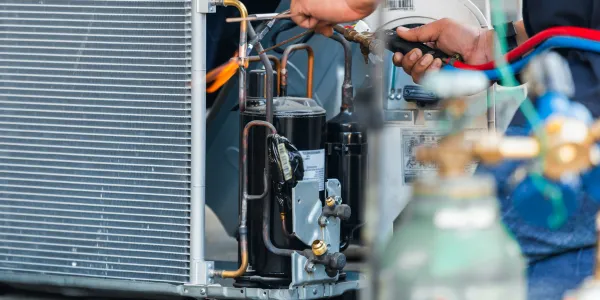AC Refrigerant Leaks: What Colorado Homeowners Need to Know
If your air conditioner is blowing warm air, running longer than it should, or making a hissing sound, you might be facing one of the most common (and frustrating) cooling issues: a refrigerant leak.
For homeowners in Boulder and Colorado Springs, refrigerant leaks can be especially troublesome, especially during those unpredictable Colorado heat waves. Whether you’re trying to stay cool at high altitude or manage energy bills in an older home, here’s what you need to know.
What Is Refrigerant and Why Does It Matter?
Refrigerant is the chemical compound inside your AC system that absorbs heat from your home and releases it outside. It’s what actually makes the cooling process happen. Without enough refrigerant, your air conditioner can’t cool effectively, which means poor comfort, higher energy bills, and even potential system damage. Because we experience significant temperature shifts and elevation changes in Colorado, even a small refrigerant issue can feel bigger, especially in the mountains or foothills where systems work harder.
Key Signs You Might Have a Refrigerant Leak:
- Homeowners in Boulder and Colorado Springs should keep an eye out for these telltale signs:
- Warm air blowing from vents
- Longer cooling cycles or system running constantly
- Higher-than-normal energy bills
- Hissing or bubbling sounds near the AC unit
- Ice buildup on the refrigerant line or evaporator coil
- Poor airflow or uneven cooling in your home
What Causes AC Refrigerant Leaks?
In both Boulder and Colorado Springs, environmental factors like dust, wildfires, and seasonal air quality changes can put extra strain on your system, making leaks more likely in older or overworked AC units.
Leaks can happen for a variety of reasons, including:
- Corrosion of metal components, especially common in older units
- Vibrations from the compressor causing joints to loosen over time
- Factory defects or poor installation
- Wear and tear on copper refrigerant lines
A Common Question We Get: Can You Just “Top Off” the Refrigerant?
Recharging refrigerant without fixing the leak is only a temporary fix. The refrigerant will leak out again, and the issue will return (often worse than before). Not to mention, it’s illegal to knowingly recharge a leaking system without repairing it, according to EPA regulations.
What to Do If You Suspect a Leak
If you suspect your AC system has a refrigerant leak, it’s important to schedule a professional inspection right away. We’ll always give you honest options—whether that’s repairing the leak, making a larger repair, or helping you plan for a system replacement if your unit is nearing the end of its lifespan.
Here’s how we help:
- Pinpoint the source of the leak
- Repair the damaged component(s)
- Recharge the system with the correct refrigerant
- Test for pressure and efficiency to confirm a full fix
How to Prevent Refrigerant Leaks
Preventive maintenance is your best defense. Our Club Membership includes biannual safety inspections, where our certified technicians check for leaks, test refrigerant levels, and inspect your entire system for efficiency and performance.
With Boulder’s elevation and Colorado Springs’ temperature swings, these routine checkups can help you avoid costly repairs and extend the life of your HVAC system.
Final Thoughts
If you’re noticing symptoms of a refrigerant leak or want peace of mind before the next heatwave, contact Meyers today. We’re locally owned, expertly staffed, and ready to help homeowners in both Boulder and Colorado Springs stay cool all summer long.
Proudly serving Boulder, Colorado Springs, and the surrounding Front Range communities.

